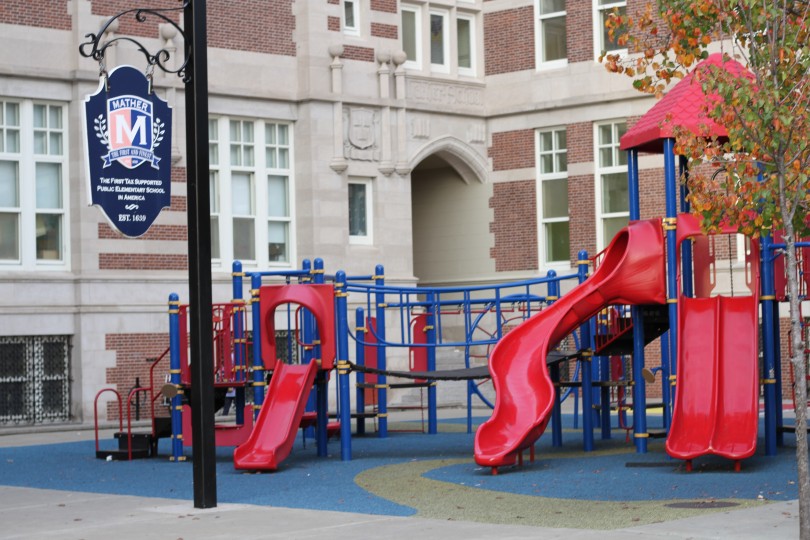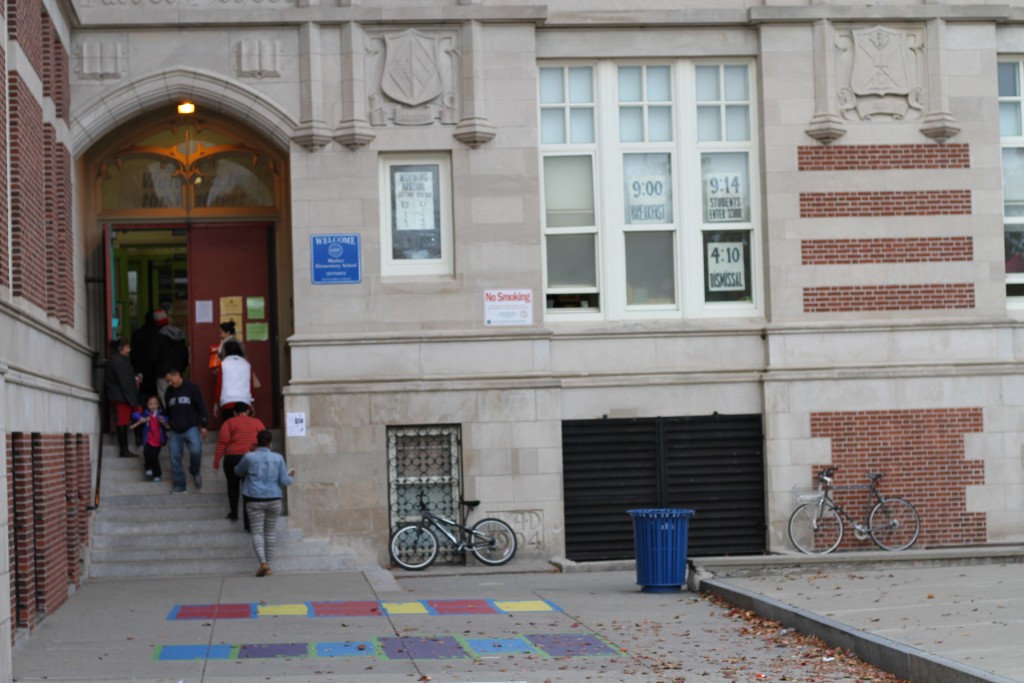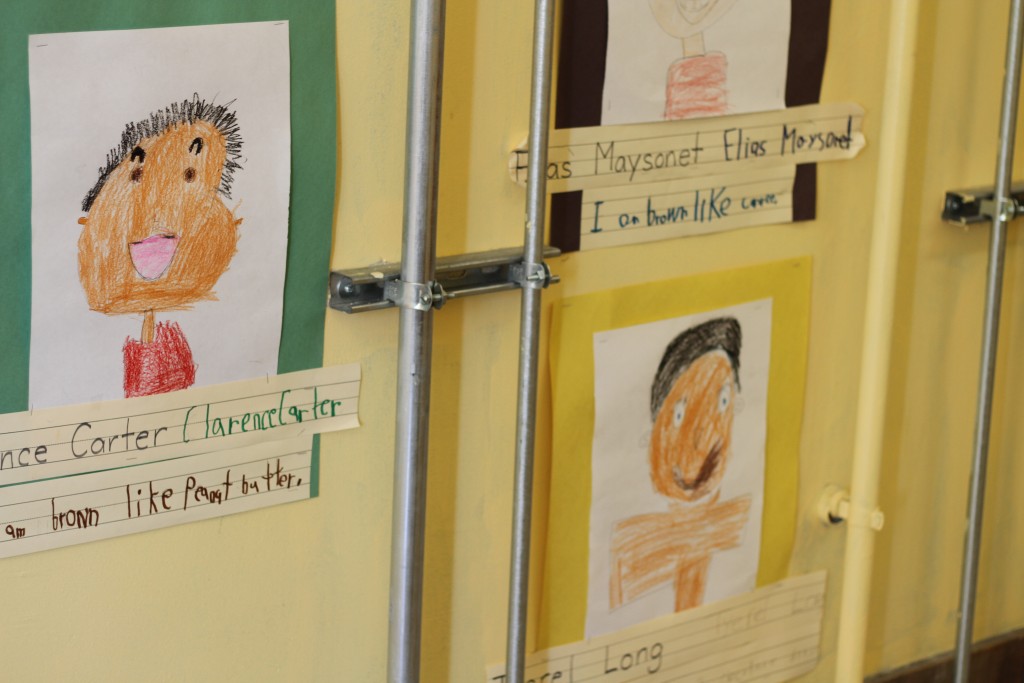By Carly Sitrin
BU News Service
Mather Elementary School doesn’t look 376 years old. With bright yellow hallways, a recently renovated library, and newly waxed gymnasium, the building hides its age well. The walls are covered in student artwork and striped bubble letters spelling out the school’s “3 B’s of Mather Success”: “Be Safe. Be Respectful. Be Responsible.”
And though the students’ drawings depict and environment of tolerance, acceptance, and kindness, the staff at the Mather School, the oldest public elementary school in the country, knows that the world just outside their doors is not nearly as forgiving.
“We do a lot of praying,” says Karen Stranberg, 55, the assistant principal at the Mather School. Stranberg says that beneath the sunshine colored paint, and the friendly zigzag borders on the bulletin boards, the school is struggling. “We need support. We need supplies. We get a lot of support from the community but we just need more.”
And with 612 children currently enrolled, and a waiting list of over 100 prospective students, the Mather School is in high demand.
The school sits on Meetinghouse Hill in the C-11 district which–as the Boston Police Department recently reported–is a neighborhood grappling with high crime rates, drug wars, and poverty. This is where most of the Mather School students return to every night. According to statistics by the Massachusetts Department of Education, 84 percent of the students at the Mather School come from low income households.”
For these kids, Stranberg says, programs offered at the school such as poetry readings, ice skating lessons, free eye care and dental care, ballet classes and computer donation programs represent a brighter future for Dorchester’s youth. “We want our kids to reach higher” Stranberg says. “We want them to think about college and their future.”
Lorie Thames, 45, is the Community Field Organizer at the Mather School and she says that teaching students to be ambitious isn’t enough on its own. She says the kids need to learn how to be responsible citizens and positive forces in their community.
“We teach them to be accountable for their mistakes,” Thames says “if they mess up today we let them know ‘hey today was not great, today you did something bad, but tomorrow you’ve got a chance to make it better. Tomorrow is a new day.’”
And, Thames says, this is all with the intention of helping kids in urban areas break the cycle of poverty and criminal behavior. She says many of the Mather students come from families where one or both parents are incarcerated or in some cases, abusive.
Mai Trinh, 30, a first grade teacher at the Mather School mirrors Thames’ concerns. “Seven of my kids go to bed without seeing either one of their parents,” says Trinh. She says her goal is to try and foster a positive and safe environment for all of her students. “I tell them ‘I am here for you. We are your family here.’”
But with a student:teacher ratio of around 22:1, Trinh says it can be tough to connect with every child.
And while her students’ home lives present a unique teaching challenge, Trinh says it’s the state requirements that really get in the the way of her ability to provide Mather School students with the best education. Trinh says the state curriculum and standardized testing mandates are out of synch with the issues she sees in the classroom.
“Many of these kids don’t understand basic concepts like manners or respect because that’s not what they come from,” she says “that is something we have to teach here and that doesn’t come from test prep workbooks.”
She says that though the Mather School now has a seven hour school day–while other Boston Public Schools only require six hours–the students are only allowed 40 minutes of recess or free time. Trinh says that this play time is crucial for her students’ social development. Especially for the children whose families recently immigrated to the U.S.
With students from more than 40 countries attending the Mather School, Trinh and the other teachers work to make the curriculum inclusive and culturally sensitive. Outside one of the classrooms, students’ draw pictures of themselves with captions from Noelle Lamperti’s book “Brown Like Me.” In another hallway, they write why their names are special to them. One paper says “Binta: No one else has the same name as me,” while another reads “Anaiya: In Africa, my name means ‘flower.'”
But despite the teachers’ best efforts to foster a positive environment for their students, the Mather School is up against extremely tough odds.
“It’s getting wicked cold and the kids are not equipped,” says Karyn Stranberg “many of them immigrated from island countries and they don’t have the proper coats or hats or winter boots.” She says that while the school provides uniforms for the students, many of them can’t afford warmer protective layers and she says she fears for their safety when the winter comes.
“It started getting cold the other day, and you can see quickly who is going to be in trouble,” Stranberg says. She says she’s reached out to everyone she can for donations of sweatshirts and sweatpants but it just hasn’t been enough.
“I sent an email to Taylor Swift’s dad,” Stranberg says. “She does so much for so many people maybe she can help our kids.”
And though times seem tough for Stranberg and the Mather School, she says her efforts are well rewarded.
“I know I’m making a difference to these kids,” Stranberg says “We’re passionate about what we do. That’s why we do it and that’s why we’ll keep doing it.”











